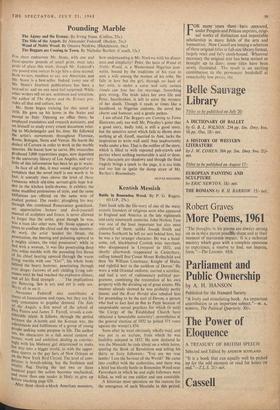Pounding Marble
The Agony and the Ecstasy. By Irving Stone, (Collins, 25s.) The Side of the Angels. By Alexander Fedoroff. (Barker, 21s.) Wand of Noble Wood. By Onuora Nzekwu. (Hutchinson, 16s.) The Beggars are Coming to Town. By Nicholas Bartlett. (Cassell, 15s.)
Put sheer endeavour Mr. Stone, with one and three-quarter pounds of small print, must take pride of place this week, though Mr. Fedorotf's one pound nine ounces brings him a close second. Roth writers, needless to say, are American, and Mr. Stone is a best-seller. Indeed, every one of Mr. Stone's fourteen publications has been a best-sel:er, and no one need feel surprised. While Other writers sell on sex, sentiment and sensation, the author of The Agony and the Ecstasy pro- vides all that and culture, too.
Mr. Stone began training for this novel in 1956. He gave up his home in the States and moved to Italy. Opening an office there, he employed translators and research assistants, and set himself to study every extant document relat- ing to Michelangelo and his time. He followed the artist's movements throughout Florence, Rome, Bologna, Siena and Venice. He learnt the dialect of Carrara in order to work in the marble quarries. He learnt how to carve. His researches Produced 5,000 typewritten pages, now deposited in the university library of Los Angeles, and very little of this information has been let go to waste.
In face of all this, it may sound ungrateful to complain that the novel itself is not worth it. In fact, it scarcely rises above the level of those romances which old-time servant-girls kept h.d- den in the kitchen knife-drawer. It exhibits the same muddled pretensions of style, and the same titillations are offered on the same note of exalted protest. The reader, ploughing his way through this combined Renaissance guidebook. art appreciation lecture and do-it-yourself manual of sculpture and fresco, is never allowed to forget that the artist, great though he was, was a man like other men. Mr. Stone appears at times to confuse the chisel and the male member. At work, the artist 'needed the thrust, the Penetration, the beating and pulsating upward to a mighty climax, the total possession'; while in bed with a woman, it was like penetrating deep into white marble with the pounding live thrust of his chisel beating upward through the warm living marble with one "Go! ", his whole body behind the heavy hammer, penetrating through ever deeper furrows of soft yielding living sub- stance until he had reached the explosive climax, and all his fluid strength . . .' The implications are flattering. Sex is art, and art is only sex. We're all in on it.
Alexander Fedoroff also contributes a quota of fornications and rapes, but they are his Only concession to popular demand. The Side of the Angels, a first novel of the school of bos Passos and James T. Farrell, reveals a con- siderable talent. It follows, through the period between the A-bomb and the Korean war, the adjustments and fulfilments of a group of young People seeking some purpose in life. The author sets his characters in a full social context of money, work and ambition, dealing as convinc- 1.4IY with his Midwest girl determined to make bet way into a bigger world, as with the upper- class queers in the gay bars of New Orleans or Oft the New York Bird Circuit. The level of com- Pe. tence is breath-taking, but the freshness and vitality flag. During the last two or three hundred pages the action becomes mechanical, abnd more than one reader is likely to give up
efore reaching page 636. After these chock-a-block American monsters,
how undemanding is Mr. Nzekwu with his direct- ness and simplicity! Peter, the hero of Wand of Noble Wood, is a Westernised Nigerian jour- nalist, bound by the traditions of his race to seek a wife among the women of his tribe. He falls in love but the girl, through no fault of her own, is under a curse and only certain rituals can free her for marriage. Something goes wrong. The bride takes her own life and Peter, heartbroken, is left to solve the mystery of her death. Though it reads at times like a handbook to Nigerian customs, the novel has charm and humour, and a gentle pathos.
I am afraid The Beggars are Coming to Town illustrates only too well Mr. Priestley's point that a good story, badly told, is still a good story, but the sensitive novel which fails to illume does nothing at all. Geoff, married to Ann, lacks the inspiration to write well until Ann inadvertently walks under a bus. That is the outline of the story, which is filled in with repeated pub-crawls and parties where nothing memorable is said or done. The characters are shadowy and though the final tragedy brings a spark to the page, it is too little and too late to ignite the damp straw of Mr. Bartlett's Bloomsbury.
OLIVIA MANNING


















































 Previous page
Previous page